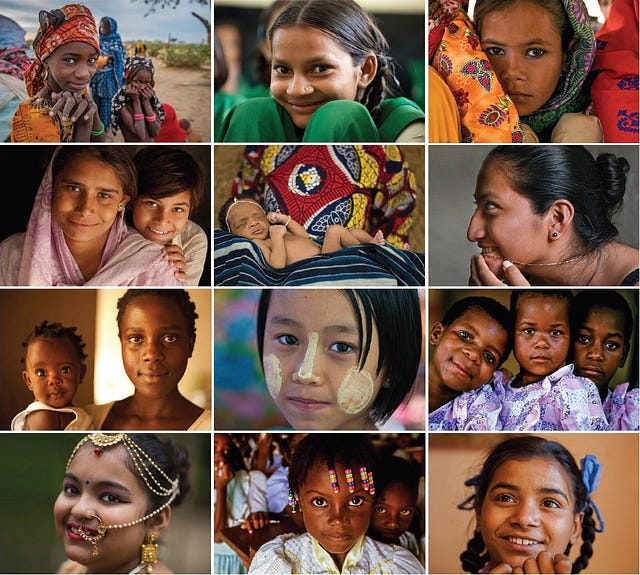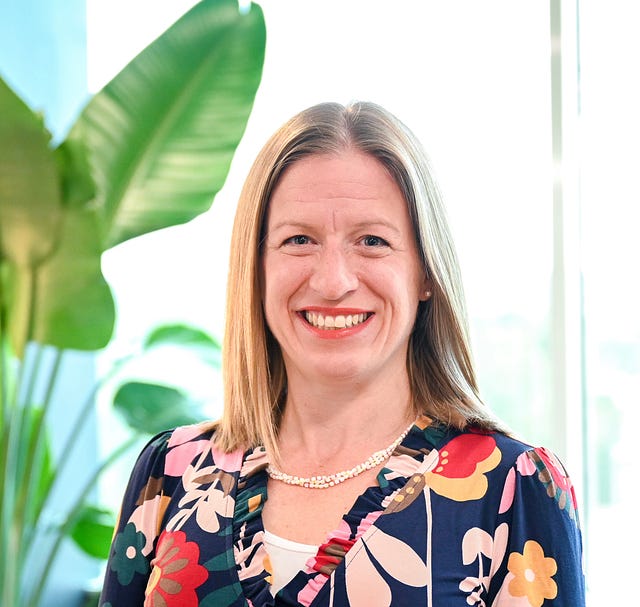Prioritize your well-being. Self-belief requires a strong foundation, and we are more vulnerable to self-criticism when physically, mentally, and emotionally stretched. When doubting our capabilities, the instinct is often to work harder, but this can be counter-intuitive. Instead, we need quality rest to consolidate new knowledge and grow.
Starting something new is scary. Learning to believe in yourself can be a critical precursor to starting a new initiative. Why is it so important to learn to believe in yourself? How can someone work on gaining these skills? In this interview series, we are talking to business leaders, authors, writers, coaches, medical professionals, teachers, to share empowering insights about “How To Learn To Believe In Yourself.” As a part of this series we had the pleasure of interviewing Liz Bloomfield.
Liz Bloomfield is a nonprofit leader, storyteller, and coach, passionate about creating a more just world where everyone thrives. As a former British Army officer serving in Iraq, executive in the corporate sector, and humanitarian responder, Liz has experienced first-hand the importance of paying attention to what is already working and elevating local leaders in addressing global challenges. She guides individuals and organizations in reframing their internal narratives for even greater impact by exploring the subconscious stories that we each hold within us. As executive director for the nonprofit Ripple Effect Images, Liz leads a world-class team of photographers and filmmakers shining a light on solutions empowering women and children globally.
Thank you so much for joining us in this interview series! Before we dive into the main focus of our interview, our readers would love to “get to know you” a bit better. Can you tell us a bit about your childhood backstory?
Growing up in the UK as part of a warm and supportive family, there were so many different directions that my life could have taken. I aspired to become an accountant from an early age, which is not typical of an average 10-year-old! Instead, my career took a different turn, and I’m grateful for that!
What or who inspired you to pursue your career? We’d love to hear the story.
My grandad was a hugely influential role model. I respected his commitment to public service and was inspired by stories from his years in the military. So, when the opportunity arose to join the British Army, I didn’t hesitate.
It has been said that our mistakes can be our greatest teachers. Can you share a story about the funniest mistake you made when you were first starting? Can you tell us what lesson you learned from that?
Prior to joining the Army, one of my earliest jobs was in a commercial bakery. During the first night shift, my supervisor tasked me with putting the crosses onto hot cross buns. Who knew that could be so tricky? I wanted to quit that first night, but I stuck it out until 5 am despite turning out a lot of wonky buns! I kept going, my skills improved, and it was an early lesson in perseverance. No matter the task, keep showing up, learning, and growing.
What are some of the most interesting or exciting projects you are working on now? How do you think that might help people?
I currently lead the nonprofit Ripple Effect Images, which uses world-class visual storytelling to shine a light on proven solutions empowering women and children globally.
During a career spanning the military, corporate, and humanitarian sectors, I’ve experienced first-hand the importance of paying attention to what is already working and elevating local leaders in addressing global challenges. My lightbulb moment came while I sat barefoot on the floor of a community center in rural Myanmar. Days in tense meetings in the capital city, Yangon, had left me disillusioned as we discussed how to protect civilians trapped in ongoing conflicts in the region. Yet as I drank tea with local women, they explained what they needed to keep their communities safe. They had the answers, but nobody was paying attention.
A more just and equitable world will only be realized through systemic change, shifting the narrative towards what works and encouraging investment in proven solutions empowering women globally. Ripple works with nonprofits across the globe, from grassroots to multinational, to level up their storytelling and increase their impact.
I also specialize in helping change-makers increase their impact without compromising their well-being. I empower people from all walks of life to transform their lives by reconnecting with their purpose, supercharging their energy levels, and accelerating their impact. And as a member of the groundbreaking Women Emerging Virtual Expedition, I am committed to finding approaches to leadership that resonate with women.
OK, thank you for all of that. Let’s now shift to the core focus of our interview. This will be intuitive to you but it will be helpful to spell this out directly. Can you help explain a few reasons why it is so important to believe in yourself? Can you share a story or give some examples?
Self-belief plays a vital role in how we perceive our happiness. The happiest people have an aligned internal narrative. The stories they tell themselves daily are consistent with the difference they seek to make in the world. Therefore, believing in yourself is essential to recognizing and living your best life.
What exactly does it mean to believe in yourself? Can I believe that I can be a great artist even though I’m not very talented? Can I believe I can be a gold medal Olympic even if I’m not athletic? Can you please explain what you mean?
Believing in yourself centers on the stories we tell ourselves about our capabilities. An essential component of self-belief is elevating your awareness of where you are now and where you want to get to, then objectively assessing what it will take to close the gap.
A person can certainly believe that they have the potential to become a great artist, but if they expect this to happen within a matter of weeks, this could be considered delusional. Unfortunately, the opposite is more common, with many people overestimating the gap and struggling even to get started.
Was there a time when you did not believe in yourself? How did this impact your choices?
My self-belief has wavered most significantly during transitions, whether moving into a new sector professionally, relocating to a different country, or becoming a parent. I had unreasonable expectations of myself on each occasion and was disappointed when I fell short. I told myself a story of failure rather than a story of growth. My self-confidence dropped, and I felt more compelled to prove myself. As a result, I’d put in long hours, often to the detriment of my well-being.
At what point did you realize that in order to get to the next level, it would be necessary to build up your belief in yourself? Can you share the story with us?
The turning point came when I realized that the stories I told myself about my capabilities would always be true, even if not the truth. But, more importantly, I recognized that I had the freedom to choose a different story.

What are your top 5 strategies that will help someone learn to believe in themselves? Please share a story or example for each.
- Reconnect with your purpose and the difference you want to make: For example, while working in the corporate sector, I learned many new skills and gained valuable experience; however, I realized that to believe in myself fully, I needed my work to align more closely with my values.
- Pay attention to the stories you tell yourself: Pause throughout the day and reflect on what might be causing you to doubt yourself. iPEC Core Energy Coaching™ focuses on identifying and moving past our energy blocks. For example, are you assuming because something happened in the past, that it will happen again? What are some other possible interpretations regarding your situation? Is a stereotype or generalization that you’ve learned and accepted about yourself limiting you somehow?
- Focus on what’s working: Energy attracts like energy, yet many of us concede a considerable amount of our mental head space to ruminating on the negatives. What didn’t go to plan, what we failed to get done, and where we are falling short. If we regard all experiences as opportunities for growth, we set ourselves up for success with the self-belief to take the next step, which drives our daily habits and behaviors.
- Be clear on your ‘who’: When our self-belief is wavering, we may have lost some of our sense of identity. Our values, what we stand for, and what’s most important to us. Such doubts are common during transition periods, such as becoming a parent, leaving a job, or being diagnosed with a chronic illness.
- Prioritize your well-being. Self-belief requires a strong foundation, and we are more vulnerable to self-criticism when physically, mentally, and emotionally stretched. When doubting our capabilities, the instinct is often to work harder, but this can be counter-intuitive. Instead, we need quality rest to consolidate new knowledge and grow.
Conversely, how can one stop the negative stream of self-criticism that often accompanies us as we try to grow?
Most of us have succumbed to a feeling of not being good enough at some point in our lives. And for many, these feelings show up every day. Acknowledging those feelings is an essential and empowering first step, whether journaling or sharing with a friend or mentor. Naming negative emotions can take away a lot of their power and brings clarity about whether they are serving us.
Are there any misconceptions about self-confidence and believing in oneself that you would like to dispel?
There is a common fear that by believing in oneself and exhibiting self-confidence, there is a risk of being perceived as arrogant. However, the reality is that just by recognizing this, you have the humility necessary to guard against arrogance.
What advice would you give to someone who is struggling with imposter syndrome?
Start by taking the time to get curious about where these feelings are coming from. Enlist support from a coach, mentor, or friend who can help you understand how your thoughts and feelings show up in your actions. Having someone hold up a mirror can offer much more clarity than trying to understand these feelings alone.
Ok, we are nearly done. You are a person of great influence. If you could inspire a movement that would bring the most amount of good for the greatest number of people, what would that be? You never know what your idea can trigger.
Ripple Effect Images envisions a world in which all women thrive. We believe women and children are the best investment the world can make. We multiply the impact of proven and sustainable solutions empowering women by using world-class visual storytelling to highlight successful initiatives. We elevate, we amplify, we accelerate. We’re turning ripples into waves!
We are very blessed that some of the biggest names in Business, VC funding, Sports, and Entertainment read this column. Is there a person in the world, or in the US, whom you would love to have a private breakfast or lunch with, and why? He or she might just see this, especially if we both tag them 🙂
Oprah and Reese Witherspoon are fabulous storytellers using their talent and networks for the greater good. We’d love to find a way to bring them on board with the work of Ripple Effect Images!
How can our readers further follow your work online?
To find out more about the nonprofit Ripple Effect Images follow us on Instagram (@rippleeffectimages) and check out our website: https://www.rippleeffectimages.org/
And for more insights on how Liz supports individuals in reframing their internal narratives for even greater impact, visit her website: https://liz-bloomfield.com/
Thank you for these really excellent insights, and we greatly appreciate the time you spent with this. We wish you continued success.


